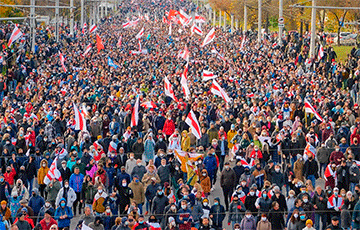No Credit: Kremlin Does Not Recognize Legitimacy Of Lukashenka
57- 1.03.2021, 11:06
- 51,808

Will empty wallets drive people to the streets?
The government of Belarus has banned raising the prices of basic necessities and medicines. The experts predict shortage of basic goods, growth of gray economy, financial problems for producers and trade, and call such a step "an alarm bell". The political crisis is at the heart of the problems, Nezavisimaya Gazeta reports.
The government decree № 100 "On temporary measures to stabilize prices of socially important goods of prime necessity" was signed on February 23 and published on February 24. The document prohibits raising prices for 62 products, considered by the government as socially important, as well as 50 most commonly used drugs in the remaining days of February. Since March it will be possible to raise prices on them by 0.2% per month and by permission of a special government commission. The list of goods includes bread, flour, meat, sausages, eggs, tea, coffee, wipes, toilet paper, diapers and even matches, medicines - antibiotics, antipyretics, some sedatives, etc. "The decision was taken to minimize the impact on consumer demand of rising costs among the organizations with a high share of imports in the cost of production, rising prices of goods of critical import, deteriorating conditions for foreign business (quarantine measures, restrictions on the export of certain goods)," - the Ministry of Trade and Antimonopoly Regulation explained.
Belarus has experience in introducing state regulation of pricing, so it's not difficult to predict the possible consequences of this decision. The previous attempt to freeze prices took place less than a year ago - in April 2020. At that time, the decision to limit price growth to 0.5% per month survived for about two weeks, and the government had to cancel it. Prior to that, similar measures were taken in 2014, and the business community was also fighting for free pricing in 2008-2009. The result was always the same.
Increased shortage of goods, reduced quality, destruction of brands and familiar packaging to deceive controllers; growth of gray economy; reduction of budget revenues; criminalization of economic activity, "when controllers would take bribes for not noticing price increases"; increased number of manipulations with imports, creating better conditions for imported goods than for the domestic ones, the rise in import prices, including in the contraband ones; worsening financial situation for manufacturers and trade organizations, resulting in increased number of bankruptcies with loss of jobs, an increase in social tension - this is what these measures can lead to.
Analysts pay attention to the fact that the officials do not mention one of the main causes of rising prices - the increase of VAT on certain goods, and in particular on drugs. That is, in fact, by such a decision, the government has increased the costs for the companies, but has forbidden to include them in the price of goods, which will inevitably lead to the reduction of their income.
A few days ago, the expert community was discussing that Russia would provide financial support to the Belarusian regime. Citing sources, it was reported that the allocation of a $3 billion loan to Belarus would be discussed at the meeting with Russian President Vladimir Putin, held on February 22. However, the visit has taken place, but there's no information about further support. Moreover, the results of the meeting have not been announced either in Moscow or in Minsk. The experts are trying to guess at least the overall tone of the talks judging by the short phrases leaked into the public space, Lukashenka and Putin's postures, the way they were dressed and spent time.
The experts believe that the most significant features of the meeting were its stressedly informal nature "without ties," taking notes of Putin's words by Aliaksandr Lukashenka and his return to the topic of integration action plans, the number of which, it turns out, has already grown from 31 to 33. The experts interpret these facts as the weakness of Lukashenka's position and the Kremlin's declaration of his illegitimacy.
For example, political analyst Andrei Kazakevich believes that the Russian authorities will not sign any serious documents with the leader of the country, whose legitimacy is not recognized by the world and the majority of the Belarusian society. "There are two ways - either new elections, or time, delaying the situation hoping that the protests will die down and the society will get calmer. The settlement of this problem is important for Moscow - only then it is possible to carry out some integration initiatives," - the expert believes.
"If to push them through now and even if they are achieved, there will appear more problems and questions. New agreements, new statuses will not be recognized by Western countries, new sanctions against Russia are possible," - the analyst believes.
"Russia also understands that it is impossible to continue the union integration further. Sooner or later, the power in Belarus will change, other people will come to power," - former head of the Supreme Soviet of Belarus Miachyslau Hryb believes.









